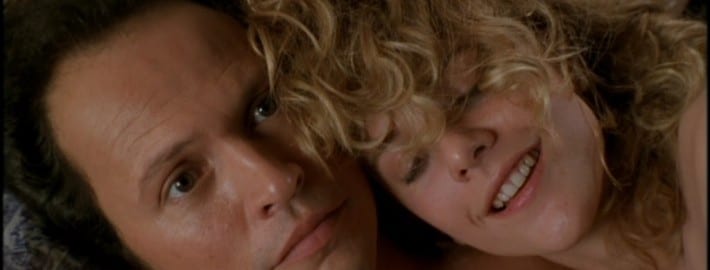It’s the age-old question. Debated amongst many.
I caught “When Harry Met Sally” on cable the other night (it was a Monday, the only night a week I am home by myself, sans boyfriend or work events).
I guess the movie “proves” that men and women can never be 100% friends – the potential for them to be more is always there, regardless of platonic behavior. The curiosity of what it would be like to date your friend ducks in and out of the edges of possibility, whether you intend to act on it or not.
It got me thinking about all of my past significant relationships. Every single one of them, including my marriage, started with friendship. My ex-husband and I were good friends for three years in college before we started dating our senior year. Neither one of had a crush on the other previously; we both agreed our feelings had been strictly platonic. And they were. But the potential for the chemistry to shift with the wind was always there, whether we knew it or not. My ex-cub and I were friends first too – but with some benefits (perhaps therein lies the…uh…rub).
With both those relationships, my sister had said, “It’s like ‘When Harry Met Sally!’” implying that those relationships were sure to last. It gave me comfort, and the assurance that relationships that begin with friendship are the best kind. You already know one another, and since you’re not trying to woo the other person you are free to be yourself. So naturally a relationship that starts in that manner trumps a relationship that starts where romantic options are in plain sight, where you calculatedly reveal parts of yourself over time.
But does it? Does starting a relationship with friendship actually insure its longevity and strength?
I wrote a post supporting this theory just a few months ago. My ex-cub and I had just broken up and I was braving the dating trenches. I couldn’t figure out how I could enter into a relationship with someone where our agendas distorted our perception of one another. I believed that I’d have better luck falling in love with someone I already knew, or met in a platonic fashion. I thought I would need to discover that I loved them over time, the way it happened for Harry and Sally.
My boyfriend and I had an intense talk the other day, where we discussed deeper issues and what is important to us long term. Afterwards, it dawned on me that this kind of conversation might never have occurred had we been friends first. We would have assumed we knew those things about eachother already. But are those kinds of assumptions a short cut around really digging deep into what makes the other person tick? Are they detours around the hard work that inevitably makes your foundation stronger, and your love for one another heartier?
After our talk, I felt a newfound surge of love, one that felt more expansive and sustainable than what I had felt before. I realized that in this relationship, one in which we were not friends first, our friendship gets to grow alongside, or inside, our romantic one.
This time, no one can exclaim, “It’s like ‘When Harry Met Sally!’”
And I’m a lot more comfortable with that.




I would say that starting a relationship that first started in friendship gives it a better chance to move from Eros to a more authentic Philos, from erotic love to a love that is beyond “only” sexual love. Said another way, if I take out the clinging expectations of “longevity” and “strength,” then perhaps the deeper, more abiding love develops.
Hmm… really interesting post. I guess I can see both sides of that. I have a couple close male friends and I do think that the chance to turn it into romance is always there, however we have to consciously decide that it is a friendship and only a friendship. I, of course, am now curious if they would see it the same way (though I don’t see myself asking!).
Good luck in your new relationship!
Good question. I think it can work either way, depending on the relationship and the people! Friendship first shouldnt equal lazy or complacent. You have to work to get to know eachother for a relationship to deepen and evolve.
Cougel,
You describe three kinds of relationships: friends, “friends with benefits”, and dating (which by extension I assume includes marriage). That confuses me. It seems to imply that the line between friends and “benefits” is purely physical? Then the line between “benefits” and dating must be purely emotional — a decision of either exclusivity or commitment?
If that’s true, then dating does not necessarily include any “benefits” — after all, the boundary is purely an emotional ome. Yet outside of certain circles, no one would consider dating that way.
Why? What am I missing?